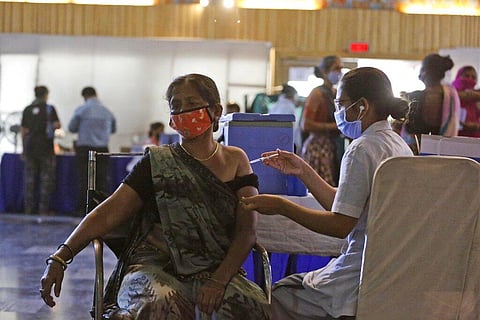

NEW DELHI: Expansion of vaccination coverage, use of masks with higher filtration capacity and effective social distancing are among a slew of recommendations put forward by a team of experts on combatting the anticipated third wave of the COVID-19 pandemic.
The team, led by a Nagpur-based think-tank, comprises experts from the IIT, the IIM, the IISER among other institutions.
The Research for Resurgence Foundation (RFRF) has come up with an independent report on "COVID-19 Third Wave and Beyond: Action Plan for Preparedness", which was shared with reporters here on Tuesday.
"We strongly recommend use of masks of different types and properties that have higher filtration capability for effective control of rapid spread of COVID-19 Delta+ variant. Face masks are truly most protective for individual to prevent infection. These are mandatory and simple barriers which help to prevent respiratory droplets of various sizes," the RFRF said in a statement.
Early identification and notification of post-Covid health complications such as mucormycosis is also recommended to fight the menace, it added.
Promotion of acceptance of vaccine by joining hand with local community level leaders is also recommended.
The key to fight against COVID-19 is effective coverage of vaccination of population in both urban and rural areas.
Community-level awareness by local social leadership will bring pace to vaccination by removing apprehensions, the experts said.
The world has been facing socio-economic and health system challenges due to the unprecedented pandemic situation.
A third wave of the pandemic is also anticipated.
Since vaccination is being provided for those above 18 years of age, it is apprehended that probably children will be more vulnerable during the next wave, the statement said.
Sachchidand Joshi, chairman, RFRF said the think-tank has decided to prepare the report as part of its policy research on the current challenges.
The team of experts included Professor Sarit Das from IIT-Madras as convener, Dr Rajesh Biniwale, CSIR-NEERI, Professor Saurav Pal, IISER Kolkata, Professor MLB Bhatt, King George Medical University Lucknow, Professor Mahadev Jaiswal, IIM Sambalpur, Professor Vinayak Deshpande, Nagpur University, Professor B Chopade, Babasaheb Ambedkar Marathwada University, Professor Udit Bhatia, IIT Gandhinagar and Mukul Kanitakar, Bharatiya Shikshan Mandal.
Eleven different aspects such as health, vaccination, AYUSH integration, predictive modelling, economic issues, sustainability aspects and possible safety through disinfection devices are included in the report.
The report is the outcome of interactions between the experts and peer review, the statement said.
The work on the report started in early May during the second wave and was completed around mid-June, the think-tank said.
Recommendations have been given at the levels of states, central government, academic institutions and civic society for better preparedness to minimise the impact of the third wave of COVID-19 and any similar situation beyond the third wave, Biniwale said.
The report is being disseminated among policy makers, academicians and other stakeholders for its effective implementation, the statement said.
Other key recommendations include notifying the changed symptoms, updating the epidemiology based on the prevailing data on age, sex, socio-economic patterns, early identification and notification of post-Covid health complications such as mucormycosis.
AYUSH integration with allopathy treatment for improved immunity and post-Covid health management has also been recommended.
An easy way to decrease the SARS-CoV-2 infection rates is to avoid virus exposure.
People from India should avoid travelling to countries highly affected by the virus, practise proper hygiene and avoid consuming food that is not home cooked, reads the list of recommendations.